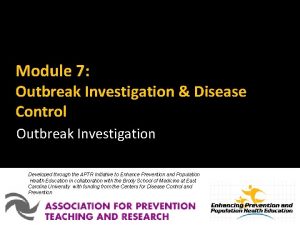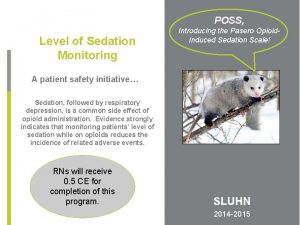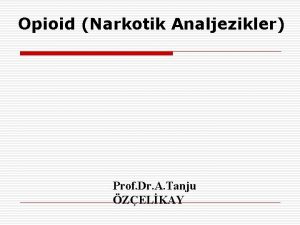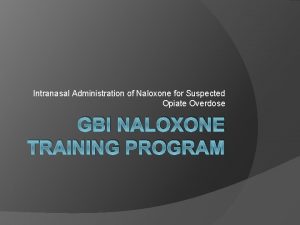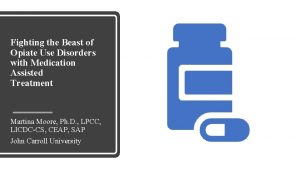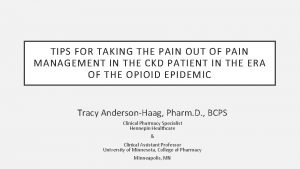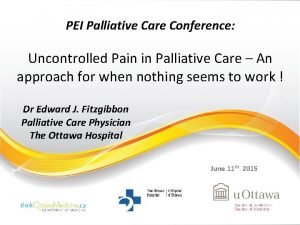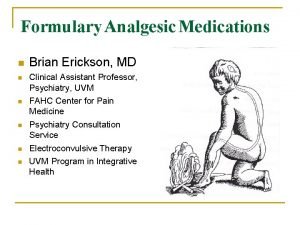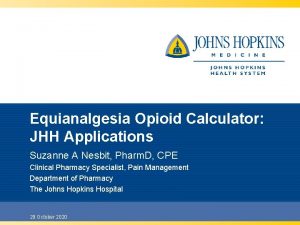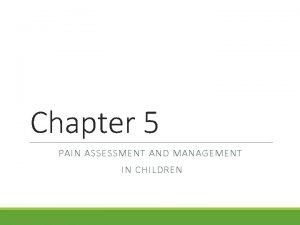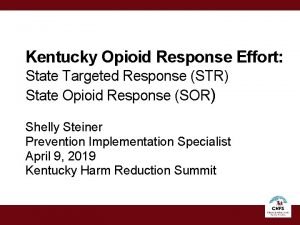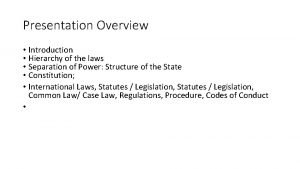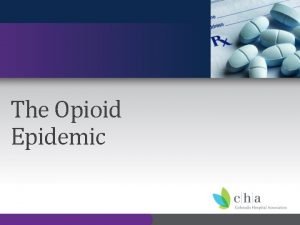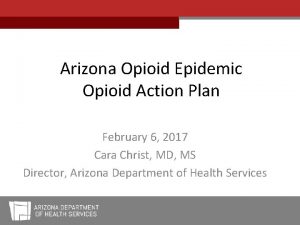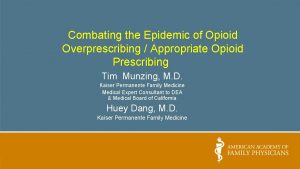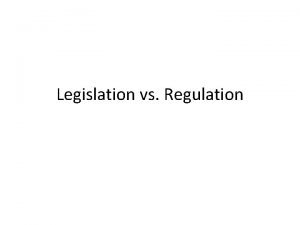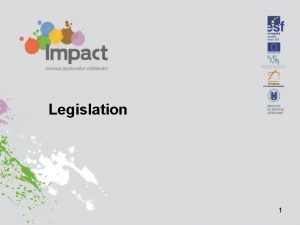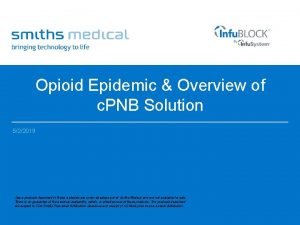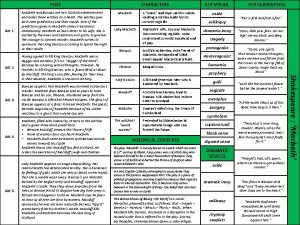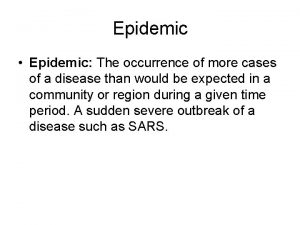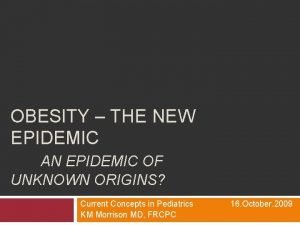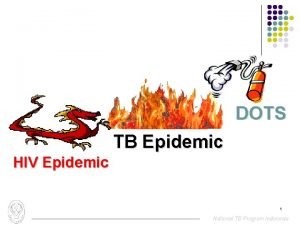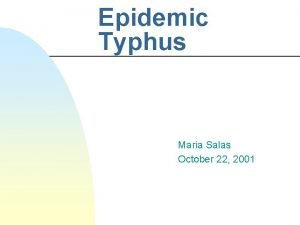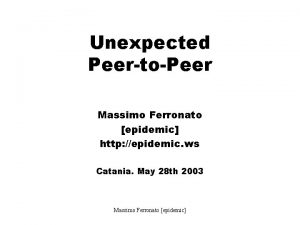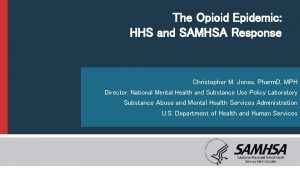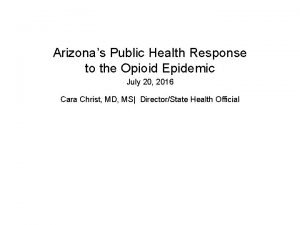Overview of Opioid Epidemic Act Special Session Legislation

























- Slides: 25

Overview of Opioid Epidemic Act Special Session Legislation

Timeline June 1, 2017 – Arizona Department of Health Services (DHS) reports 790 people died in 2016 as a result of opioid overdoses, a 74% increase in four years June 5, 2017 – Governor Doug Ducey Declares State of Emergency September 5, 2017 – DHS releases Opioid Action Plan , includes numerous legislative recommendations January 9, 2018 – Governor Ducey announces call for special session in his State of the State Address January 22, 2018 – Special session begins January 25, 2018 – SB 1001, Opioid Epidemic Act passes unanimously by House & Senate

Rationale for Legislation • The opioid epidemic continues to grow significantly in Arizona with more than 910 suspected overdose deaths and 5, 810 overdoses reported since June 15, 2017 to February 16, 2018 • The opioid epidemic has been at the forefront in the news locally and nationally, it is an emergent priority issue for policymakers everywhere • Unprecedented and sweeping policy changes impacting physician pain management and prescribing practices are being imposed in Arizona and many states • Rightly or wrongly, physicians are held responsible for initiating and prolonging the opioid epidemic so aggressive legislative reforms were inevitable

Physician Advocacy • Physicians are deeply committed to ending the opioid epidemic in Arizona • AOMA and the Arizona Medical Association (Ar. MA) engaged in partnership with the Governor, Arizona legislators, and DHS as proactive and supportive stakeholders • Through this partnership, AOMA and Ar. MA physicians, staff, and lobbyists worked tirelessly to advocate for legislative provisions to protect vulnerable patients; examples include exceptions for patient types/circumstances, delayed effective dates for implementation, and additional substance abuse treatment resources • AOMA and Ar. MA successfully advocated for significant reforms to be included in SB 1001 to limit restrictive prior authorization policies by health plans to improve access to non-opioid therapies

Physician Advocacy (cont’d) AOMA Statement on Opioid Epidemic Act “The AOMA is committed to ending the opioid crisis and we support Governor Ducey’s proposed legislation to address the opioid epidemic. Physicians are deeply concerned about the growth and prevalence of opioid abuse/misuse and related fatalities from overdoses. We will continue working with the Governor and policymakers to ensure these legislative reforms are successfully implemented and achieve all of the desired goals and objectives. ” Next Steps • Educating physicians and implementing provisions of SB 1001 Opioid Epidemic Act; unless specified otherwise, provisions go into effect April 26, 2018 • If necessary, seek amendments to legislative provisions if significant problems arise • There will be substantial administrative rulemaking necessary to define and implement the new laws

Understanding & Preparing for the New Changes • The Opioid Epidemic Act is complex – we strongly recommend setting aside time to understand the new laws and preparing in advance of its implementation; most of its provisions will go into effect April 26, 2018 • If you are unclear about the law and its provision, make sure to review the text of the actual legislation for guidance and consult an attorney if necessary; do not solely rely on summaries, news articles, etc. for implementation • The remaining slides in this slide deck summarize the major provisions in the bill; although it is comprehensive some minor details may be missing or excluded

Opioid Epidemic Act Index of Provisions 1. 5 -day Initial Fill Limit 2. 90 MME Dosage Limits 3. Electronic Prescribing 4. Medical Education 5. Prescription Monitoring Program 6. Regulation of Pain Management Clinics 7. Dispensing & Pain Management 8. Prior Authorization Reforms 9. Prior Authorization Reforms for Chronic Pain 10. Medication Assisted Treatment 11. Public Safety 12. Substance Abuse Initiatives

5 -day Initial Fill Limit • Limits “initial prescriptions” to all patients for a Schedule II opioid controlled substances to a 5 -day supply; similar 14 -day limit following a surgical procedure; regulatory boards may be more restrictive • Defines “initial prescription” as a Schedule II opioid controlled substance that has not been dispensed to the patient during the previous 60 days, confirmed by the Prescription Monitoring Program • Provides the following exceptions to the initial fill limitation when the patient: o o o o o Has an active oncology diagnosis Has a traumatic injury, not including a surgical procedure Is receiving hospice care Is receiving end-of-life care Is receiving palliative care Is receiving skilled nursing facility care Is receiving treatment for burns Is receiving MAT for substance abuse disorder Is an infant being weaned off opioids at the time of hospital discharge

90 MME Dosage Limits • Prohibits healthcare providers from issuing a new prescription order that exceeds 90 morphine milligram equivalents (MME) per day; exceptions include: o Continuation of prior prescription order within the previous 60 days o An opioid with a maximum approved total daily dose in the labeling as approved by the FDA o A patient who: q q q q q Has an active oncology diagnosis Has a traumatic injury, not including a surgical procedure Is receiving hospice care Is receiving end-of-life care Is receiving palliative care Is receiving skilled nursing facility care Is receiving treatment for burns Is receiving medication assisted treatment (MAT) for substance abuse disorder Is hospitalized

90 MME Dosage Limits (cont’d) • A healthcare professional may issue a new prescription above 90 MME to a nonexempt patient after first consulting with a physician who is board-certificated in pain; if consulting physician is not available within 48 hours of the request the healthcare professional may prescribe and subsequently have the consultation; teleconference consultation is permissible • Physicians who are board-certified in pain may issue a prescription order above 90 MME without a consultation • If a patient is issued a new prescription above 90 MME per day, the prescriber must also prescribe Naloxone or other opioid antagonists

Electronic Prescribing • Beginning January 1, 2019, requires e-prescribing to dispense Schedule II opioid controlled substances in Maricopa and Pima counties; exception for MAT • Beginning July 1, 2019, requires e-prescribing to dispense Schedule II opioid controlled substances in all other counties; exception for MAT • Requires the Arizona Board of Pharmacy to establish a process to grant waivers from e-prescribing requirements due to lack of broadband access or hardship • Requires Board of Pharmacy to provide a report to the Governor and Legislature by September 1, 2018 on the ability of prescribers to access and use e-prescribing to comply with these requirements

Medical Education • Requires a student enrolled in a public or private medical program in this state and whose intended degree may make the student eligible for a United States Drug Enforcement Administration registration to take at least three hours of opioid-related clinical education • Requires a healthcare professional authorized to prescribe Schedule II controlled substances or who is authorized to dispense (pharmacists) controlled substances to complete a minimum of three hours of opioid-related continuing medical education each license renewal cycle as part of their existing requirements

Prescription Monitoring Program (PMP) • Eliminates from the current list of PMP review exemptions prescriptions under 5 days when the PMP had been checked within the previous 30 days • Provides unconditional access to the PMP to the health licensing boards; currently they must have an open investigation or complaint to retrieve the information • Requires pharmacists to be registered and have access to the PMP o Before dispensing a Schedule II controlled substance, pharmacists shall obtain a PMP report for the proceeding 12 months; allows for waivers for technological limitations or exceptional circumstances out of their control o Allows licensed pharmacy technician trainees, pharmacy technicians or pharmacy interns to serve as delegates to pharmacists

Regulation of Pain Management Clinics • • Beginning January 1, 2019, requires pain management clinics to meet the same licensure requirements as other DHS licensed healthcare facilities; additional requirements for informed consent, medical director responsibilities, annual record keeping & reporting, and physical examination requirements Defines “Pain Management Clinic” as a healthcare institution or private office or clinic in which a majority of patients in any month are prescribed opioids, benzodiazepines, barbiturates or Carisoprodol for more than 90 -days in a 12 month period; does not include MAT Pain management clinics must have a licensed physician with an unrestricted and unencumbered license to serve as the medical director Rules expected to be similar to other healthcare facility regulations; DHS will need to promulgate administrative rulemaking to implement

Dispensing & Pain Management • Prohibits healthcare professionals from dispensing Schedule II controlled substances that are opioids (act of unprofessional conduct); exception for MAT • Limits veterinarians from dispensing Schedule II controlled substances to 5 -days; 14 -days for benzodiazepines; 30 days limits after initial fills for chronic conditions • Requires that containers of Schedule II opioid controlled substances dispensed by a pharmacist include a red cap and warning label about potential addiction

Prior Authorization Reforms • Requires health plans to make available on their web-site or provider portal a listing of all prior authorization (PA) requirements; listing must clearly identify the specific services, drugs or devices to which a PA requirement exists, including specific information or documentation that a provider must submit in order for the PA request to be considered complete • Requires the health plans to allow providers to access the prior authorization request through the applicable software system • Specifies that the health plan or its utilization review agent must provide at least two forms of access to request a PA and must have emergency after-hours procedures • Beginning January 1, 2020, the health plans must accept and respond to prior authorization requests for prescription benefits through a secure electronic transmission; provides exceptions for providers due to financial hardship or connectivity issues

Prior Authorization Reforms • Establishes maximum timeframes for decisions on PAs: o For urgent health care services, the authorization or adverse determination must be no later than 5 days o For non-urgent health care services, the authorization or adverse determination must be no later than 14 days • Requires the health plan or its utilization review agent to acknowledge receipt of the PA request and notification to the provider whether the PA request is granted, denied or incomplete • If the request is denied the specific reason for the denial must be included. If the request is incomplete, the provider must have the option to submit additional information • Requires health plans to allow at least one medically-assisted treatment be available with PA

Prior Authorization Reforms • If a PA request is incomplete, the provider must have the option to submit additional information; after additional information is submitted the health plan has 5 days to review and respond for urgent requests and 14 days for nonurgent requests • Specifies that PAs are deemed granted if there is failure to comply with the timeframes • States that PAs are binding and may not be rescinded once a decision is made; exception in cases of fraud or misrepresentation • Allows for an appeal process in cases of denial of a PA request

Prior Authorization Reforms for Chronic Pain • Specifies that a health plan must honor a PA that is granted for an approved drug for the earliest of the following: o Six months after the date of the PA approval o The last day of the enrollee’s coverage under the plan • Allows health plans to request that the provider submit information indicating that the enrollee’s chronic pain condition has not changed and that the continuation of the treatment is not negatively affecting the enrollee’s health • If the provider does not respond within 5 business days, the health plan or its utilization review agent may terminate the PA

Prior Authorization Reforms for Chronic Pain • States the PA time limits for chronic pain do not apply to prescription medications if the FDA recommends that the drug be used only for periods less than 6 months and any opioid or benzodiazepine or other Schedule I or II controlled substances • Allows for substitutions for a comparable brand product or a generic counterpart with therapeutic equivalence evaluations • Permits PAs for longer than six months

Medication Assisted Treatment • • • Requires structured sober living homes to develop policies and procedures to allow individuals on MAT to continue receiving the treatment while living in a structured sober living home Requires health plans to allow at least one medically-assisted treatment be available with prior authorization Defines “Medication Assisted Treatment” as the use of FDA approved medications in combination with counseling and behavioral health therapies to provide a whole patient approach to the treatment of substance abuse disorders

Public Safety • • • Provides immunity from prosecution to persons who in good faith seek medical assistance for someone who experience an overdose or to persons experiencing an overdose; self repeals after June 30, 2023 Removes eligibility for a suspended sentence, probation, pardon or released from confinement for the illegal manufacture, sale or marketing of opioids Requires veterinarians who suspect a person is trying to obtain controlled substances for intent other than to treat the intended animal to report to law enforcement within 48 hours after treatment or examination; provides civil immunity for reporting Adds trained ancillary law enforcement employees to the list of persons authorized to administer Naloxone or opioid antagonist through a standing order; may include detention officers, probation officer, police aide, etc. Requires the Governor’s Office of Youth, Faith and Family to report on the feasibility of a statewide expansion of the Arizona Angel Initiative, receiving substance support and turning over drugs without fear of arrest

Substance Abuse Initiatives • Requires cities or towns to report 911 overdose calls and related overdose deaths to DHS • Requires counties to establish a drop-off location for legal or illegal substances and drug paraphernalia; person may receive referral to a substance abuse treatment facility • Beginning September 1, 2018, requires hospitals and healthcare facilities to report quarterly to DHS the following: o Locations and types of facilities where substance abuse treatment is provided o Number of available substance abuse treatment beds o Number of days facility was at capacity and unable to accept referrals • Requires DHS to report substance abuse and treatment availability and capacity information to Governor and Legislature • Requires DHS and the Governor’s Office of Youth, Faith and Family to develop a comprehensive opioid abuse prevention communications campaign

Substance Abuse Initiatives • Requires healthcare institutions to refer a patient who is discharged after receiving emergency services for a drug-related overdose to a behavioral health services provider • Requires hospice service agencies to adopt policies and procedures to inform client families on the proper disposal of Schedule II controlled substances • Requires DHS and AHCCCS to provide Naxolone kits as necessary to county health departments to provide to persons at risk for opioid-related overdose • Establishes a Substance Abuse Disorder Services Fund through AHCCCS to enter into agreements with one or more contractors to provide additional services to Title XIX or Title XXI eligible recipients as payer of last resort; provides $10 million in FY 2017 -2018 from the General Fund • Provides $400, 600 to both DHS for an opioid abuse prevention campaign and the Attorney General to award community grants for opioid education and prevention efforts.

Additional Help? Have questions, suggestions or feedback you would like to share? Please contact the Arizona Osteopathic Medical Association at 602 -266 -6699 or send an email to communications@az-osteo. org
 Epidemic broadcast trees
Epidemic broadcast trees Toxinq
Toxinq Epidemic dropsy
Epidemic dropsy Doctors attributed the epidemic to the rampant
Doctors attributed the epidemic to the rampant Endemic epidemic
Endemic epidemic Aids epidemic
Aids epidemic Endemic epidemic
Endemic epidemic Epidemic transition model
Epidemic transition model Poss scale
Poss scale Opioid reseptörleri
Opioid reseptörleri Bromazepam umrechnungstabelle
Bromazepam umrechnungstabelle Opioid overdose
Opioid overdose Opioid overdose
Opioid overdose Opioid overdose
Opioid overdose Types of pain
Types of pain Mechanism of action of opioid analgesics
Mechanism of action of opioid analgesics Nips pain score
Nips pain score Opioid receptors location
Opioid receptors location Non-opioid
Non-opioid Opioid settlement calculator
Opioid settlement calculator Non-opioid
Non-opioid Kentucky opioid response effort
Kentucky opioid response effort Macbeth act 2 summary
Macbeth act 2 summary Hierarchy of legislation
Hierarchy of legislation National policy and legislation related to child health
National policy and legislation related to child health Legis meaning
Legis meaning




